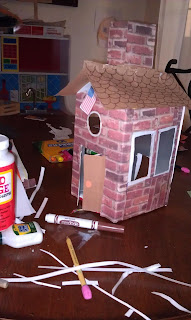First day of school was August 20th
One of Gilgamesh's new subjects is PIANO

Sir Petrus hatched a personality. He's still a very serious baby, and quiet, but he loves to smile at his family.
Right off the bat we took a vacation and went to a festival! At the festival, our little knights built things at a Home Depot station. Alastor is here with Dad, showing him the goalpost he made.
Gilgamesh's first grade curriculum from Sonlight includes Usborne book, Peoples of the World. Crafts and activity ideas pepper every other page. It's been fun trying some of them out. Like the sarong, turban, Bedouin tents, and coil pots shown here.
Gilgamesh is getting better and better at riding his bike!
When auntie came to visit, we showed her the Angry Birds game. Lots of fun!
A fun project I'd been meaning to do coincided with a poem in the Sonlight core: The House that Jack Built. We cut out pictures from the poem, like malt and a rat and put them in the finished house.
Nature walks and hikes by the local duck pond are always fun for our family.
Superdad shows Gilgamesh the ropes.

First grader
Preschooler
Here's Petrus, already 3 months old and getting more active.
Superhero costumes ahead of October's Halloween
The spider building an epic spiderweb outside our place just as we finished the year's first readaloud book, Charlotte's Web!
Alastor's three-dimensional rainbow
Gilgamesh's three-dimensional rainbow
Gilgamesh's book of dreams. Can you tell who we support for the presidential race in November?
D is for dirt, part of the Letter of the Week program we're doing for Alastor's preschool. Gilgamesh participates and has a blast doing the more arsty, basic stuff.
D is for dog
Gilgamesh's masterpiece from his first official art class. They're candy apples from a lesson on circles.
We discovered one way to get through those busy Usborne books is to copy the pages and cut and paste the individual pictures and text blocks into staple books. He gets to make a book and focus on one subject at a time. It's great! Only downer is how much ink we use up. But really, who decided children's nonfiction should be so BUSY!? Gilgamesh doesn't know where to look, so he often looks away. In the future I might try the window method I've read about: cut a square in a white piece of paper and show just one part of the page at a time.
A construction paper robot Gilgamesh constructed all by himself after seeing a similar one on Sesame Street. Take inspiration from everywhere and run with it!
To keep hands busy during readaloud time one day, I printed out some templates for tissue paper collages. It was a lot of fun for the boys but nobody heard a word I read, so we'll stick with quiet time and bedtime for readalouds for now.
We have this great
Disney Pixar drawing book that shows you step by step how to draw several popular characters. This is Gilgamesh's Wall-e and Eve. I was impressed!
Gilgamesh's planet Earth. Not an assignment, just a self-directed art project. We found a
website that showed how to make rectangles for proportions before drawing the basic shapes of the continents, so the U.S. is still pretty boxy.
Tribal masks for scaring evil spirits, another Usborne-inspired craft.
Alastor loves the dry erase board. It only keeps him busy for twenty minutes without adult guidance, though.
And guess who recently turned three!
So we've been keeping very busy! Feels like we're always a week behind, but I guess that doesn't matter as long as we're constantly learning something new. So far I love Sonlight's Core B for first grade. The science and social studies are probably the most taxing part because there's so much reading of nonfiction. But when we couple it with youtube or other online resources, we have a blast learning about blue-footed boobies and nocturnal animals and habitats. The other day we spent an hour just looking up different cultural, traditional dances and instruments on youtube. Later, Gilgamesh thrilled to recognized flamenco dancing on Sesame Street because he'd seen it before and knew its name already! It's fun to see my five-year-old beginning to remember things he's learning. Thus begins the Grammar stage of the trivium - memorization and mass learning. It's going to be an adventure.
For Alastor, we need to kick up the preschool a notch, not because he's not learning enough for a three-year-old but because he wants to be more engaged in the school process. Art, math manipulatives on the floor, and anything on youtube are his favorites to be involved with. On days when those things are scarce, he sits around playing idly by himself and then asks for a TV show or something to eat. In short, he's getting bored. So my mission next week and beyond is to keep all my boys engaged as much as possible, while allowing that down time and independent, unstructured play are also healthy, even if they don't always like it.
This is still a very new adventure for us. How long have you been homeschooling?
Any tips for newbies?
 A Thomas Jefferson Education: Teaching a Generation of Leaders for the Twenty-first Century by Oliver DeMille
A Thomas Jefferson Education: Teaching a Generation of Leaders for the Twenty-first Century by Oliver DeMille









































